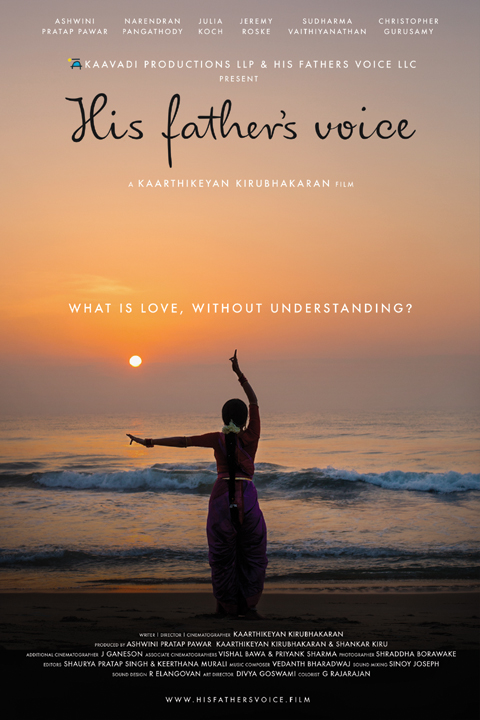Registered with the Registrar of Newspapers for India under R.N.I 53640/91
Vol. XXIX No. 10, September 1-15, 2019
His Father’s Voice – a Bharatanatyam-inspired drama
by V. Ramnarayan
English language films made in India by Indians are quite uncommon, and sometimes tend to be self-conscious and stilted. Of course, there have been a few lovely exceptions, and some of the better efforts can be free-flowingly multi-lingual, at least bilingual, as many of us are in real life conversations. The recent India premiere of His Father’s Voice, produced by Kavadi Productions – the Puducherry-based husband and wife team of K. Kaarthikeyan Kirubhakaran and Ashwini Pratap Pawar, along with Shankar Kirubhakaran – was refreshingly free of artifice, despite a storyline that offered plenty of scope for just that kind of treatment. It traces the journey, both physical and spiritual, of Kris, a young male dancer battling the rage, confusion and acute sense of loss that follow the estrangement of his parents and his father’s absence from his life since his boyhood days. Happily, the film has equally successfully avoided the safe path of a maudlin tearjerker.

Twelve years ago, Kaarthikeyan co-produced Loins of Punjab, a rollicking comedy with an Indo-American cast that included Shabana Azmi, but His Father’s Voice marks his directorial debut. The director shows a keen understanding of the medium, particularly in the restrained performances he has extracted from the dancers (as against the relatively exaggerated abhinaya of their Bharatanatyam training), and the authentic dance scenes filmed in sylvan surroundings. Hints of extramarital romance are handled delicately, if with unexpected candour, as when the father (P.T. Narendran) tells his daughter (Sudharma Vaithianathan), “There were moments,” on being asked if he had been troubled by his wife’s relationship with her American student (Jeremy Roske). It is for the same reason that the American’s wife (Julia Koch) returns to the US with their son, while her husband stays on in India to pursue his passion for Indian music.
The film has a happy ending with the music and dance deeply entrenched in the souls of the protagonists reuniting father and son in a moving, if somewhat predictable, climax. The acting is of high quality, with Ashwini quite brilliant as wife-dancer-painter-teacher-mother, quite an accomplishment for a dancer in real life with no on-screen acting experience. The other dancers in the film, P.T. Narendran, Sudharma and Christopher Gurusamy, have given creditable acting performances too, with Christopher portraying the angst and anger of his character with a surprising depth of understanding. Kalakshetra veteran C.K. Balagopalan and senior dancer Bragha Bessell are featured in a movingly metaphorical scene of filial love from the Ramayana, which ever so subtly adds to the poignancy of the narrative. The cinematography (Kaarthikeyan) fits in unobtrusively with the picturesque locale. The editing (Keerthana Murali and Shaurya Pratap Singh) and art direction (Divya Goswami) are pleasingly compatible with the languid pace of the film. One area which could do with improvement is that of the dialogue delivery of a few actors.
Apart from the tastefully choreographed dance scenes, the music by Vedanth Bharadwaj, an integral part of the story, is hauntingly beautiful, as are the voices of Vedanth and Bindhumalini Narayanaswamy. The songs and the story – “a reflection of my own inner journey”– by Kaarthikeyan show promise of greater things to come.
His Father’s Voice, which was enthusiastically received at its Hollywood premiere last year, is a commendable contribution from Tamil country to world cinema.

